
views
X
Research source
If you want more vitamin B12 in your diet, you can get it naturally by eating the right foods and tracking your intake. Talk to your doctor if you experience nausea, dizziness, or vomiting from too little or too much vitamin B12.
Getting Your Daily Recommended Value
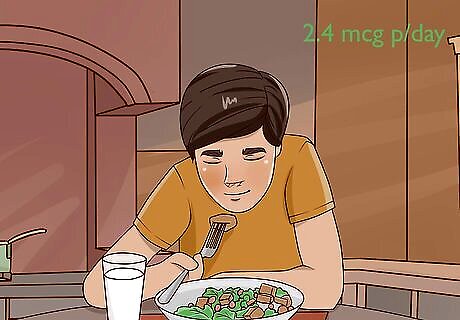
Get 2.4 mcg of vitamin B12 per day if you are over 14 years old. Older teenagers and adults need quite a bit of vitamin B12 in their daily meals. Try to track your intake and get as much vitamin B12 as you need per day to stay healthy. You can track the amount of nutrients you get online or on a health app.
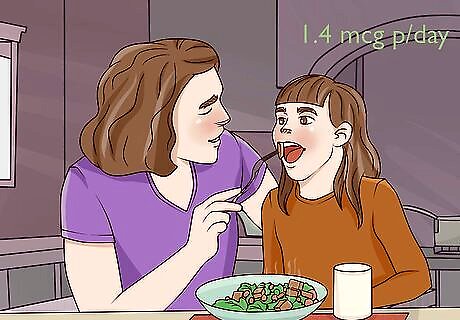
Make sure your kids get about 1.4 mcg of B12 per day. Children who are between 4 and 8 years old need about 1.2 mcg of vitamin B12, while children who are 9 to 13 need about 1.8 mcg of vitamin B12. Assist your child in getting enough vitamins and minerals through a healthy, balanced diet.
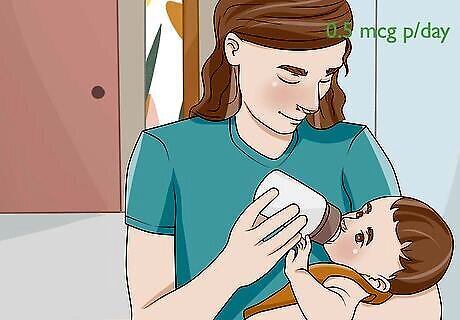
Feed your infants and toddlers about 0.5 mcg of B12 per day. Between 0 to 6 months, babies need about 0.4 mcg of vitamin B12 per day. From 7 to 12 months, they need 0.5 mcg per day, and from 1 to 3 years, it bumps up to 0.9 mcg per day.Tip: Formulas typically have some vitamin B12 in them. Check on the ingredients label to find out how much.
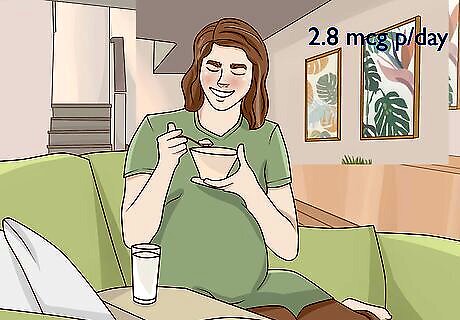
Increase your B12 consumption to 2.8 mcg if you are pregnant. During pregnancy, vitamin B12 can be critically important for the development of a healthy baby. If you do not get enough vitamin B12 while pregnant, your child could suffer from developmental delays, failure to thrive, neural tube defects, megaloblastic anemia, and movement disorders. Prenatal vitamins usually contain vitamin B12. Check the label on your vitamins to see how much they contain.
Eating Foods with Vitamin B12
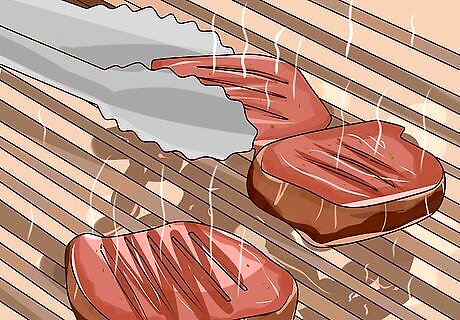
Eat beef to get more B12. Beef, including ground beef and steaks, has around 2.2 mcg of vitamin B12 in it per serving. Add beef to your diet to make sure you are meeting the recommended intake of vitamin B12 for your age group.Warning: If you have any heart problems, talk to your doctor about how much red meat you can add to your diet.
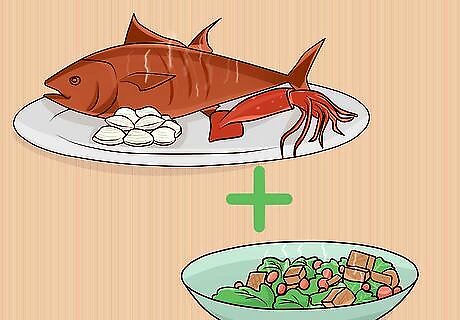
Add seafood to your diet. Clams, sardines, tuna, squid, and fish all have varying levels of vitamin B12, and they can be a healthy alternative to red meat in your diet. Make sure you eat seafood to increase your daily vitamin B12 intake and achieve your recommended amount. Fried seafood is not super healthy. Stick to grilled or baked seafood as much as you can.
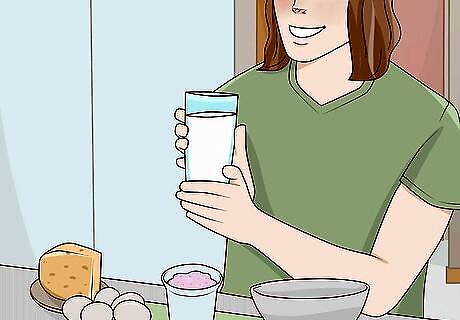
Consume dairy products to increase your B12 intake. Eggs, cheese, milk, and yogurt all have varying levels of vitamin B12 in them. Check the labels of your dairy products and add them to your diet to up your B12 levels daily. Brie has the highest amount of vitamin B12 out of all cheese types. Each serving contains about 2.4 mcg.

Find alternative sources of B12 if you are vegetarian or vegan. Since vitamin B12 comes primarily from animal products, vegetarians and vegans who are strict on their diets need to find another source of the vitamin. The most common way that vegetarians and vegans get vitamin B12 is through foods that are fortified with it. These foods include: Cheeses, such as Swiss, mozzarella, Tilsit, and feta Eggs Whey powder Cereals Bread Yeast spreads
When to Seek Medical Care
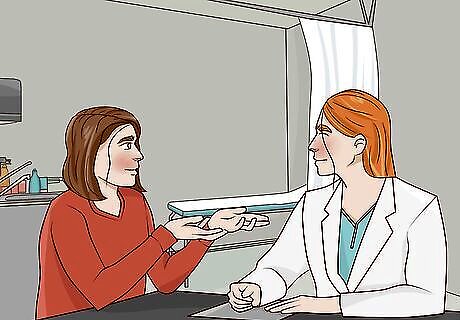
Ask your doctor if your medications might interfere with vitamin B12. Some medications can make it harder for your body to absorb vitamin B12, potentially causing a deficiency. They can also interfere with vitamin B12 supplements and make them less effective. If your medications are causing problems with your ability to absorb B12, talk to your doctor. They may be able to adjust your dosage or switch you to a different medication. Medications that may interfere with vitamin B12 include aminosalicylic acid, colchicine (Colcrys, Mitigare), metformin (Glumetza, Glucophage), proton pump inhibitors (such as Prilosec and Prevacid), and vitamin C supplements.
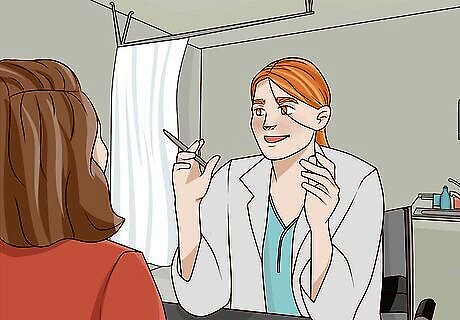
See your doctor if you have symptoms of a deficiency. A vitamin B12 deficiency can cause severe symptoms and a variety of health problems if you leave it untreated. If you have symptoms such as fatigue, shortness of breath, dizziness, or unexplained weight loss, see your doctor. Ask them to test you for a possible vitamin deficiency.Tip: If tests show that you have a vitamin B12 deficiency, talk to your doctor about what might be causing it. It will be easier to treat the deficiency if you can manage the underlying cause. Common causes of vitamin B12 deficiency include an imbalanced diet, digestive conditions such as celiac disease or Crohn’s disease, surgeries that affect your bowel function, and certain types of infections or parasites. People who follow strict vegetarian diets, people who have undergone weight loss surgery, and elderly people are those most at risk for a B12 deficiency.
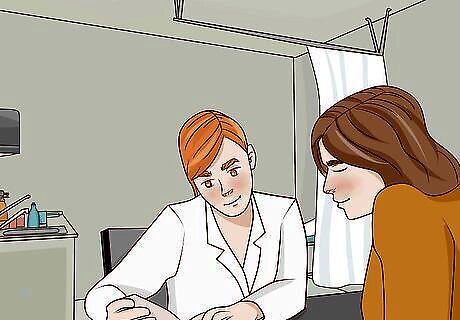
Discuss using B12 supplements if food sources aren’t enough. If you have a severe deficiency or can’t get enough B12 from your diet, your doctor may recommend taking supplements. Ask them to recommend a good-quality supplement and follow their dosage directions. Let your doctor know if you have any side effects while taking vitamin B12 supplements. Common side effects of vitamin B12 supplements include dizziness, headaches, nausea and vomiting, and anxiety.


















Comments
0 comment